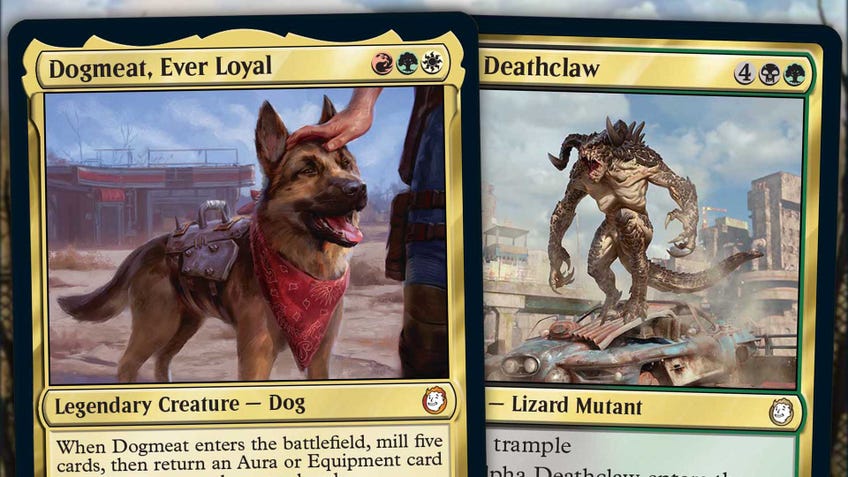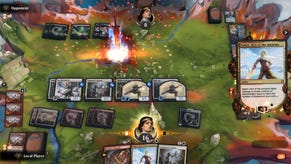Magic: The Gathering’s Fallout Commander decks struggle to find personality in the video games’ atomic wasteland
Hooray for Dogmeat.
Magic: The Gathering’s Fallout Commander decks are here, and they’re good fun. With interesting mechanics, both new and old; a good mix of colour identities; and some cool deck lists, the decks based on the video game series are another example of the mighty potential of these crossovers.
With MTG cards from Doctor Who, Warhammer 40,000, Dungeons & Dragons and The Lord of the Rings as its heavy hitters, Universes Beyond has come a long way since the initial take on the idea in the Walking Dead Secret Lair drop. It’s fair to see that most people have found at least one of these to be to their tastes now, and the most recent releases - basically all of the ones named above - have ranged in quality from being very good to exceptional, making the concept a pretty resounding success.
While there are likely still older MTG players who would still rather Magic stayed as Magic, we’re rapidly heading towards two of these sets a year plus all of the extras, so this is simply how the game is going to be going forward. One thing that makes the Fallout decks different to what’s come before, though, is character.
Of the universes listed so far, Fallout arguably has the weakest roster of characters. Part of this is because the video games aren’t as focused on individual NPCs and bosses as they are on moment-to-moment gameplay, like a Deathclaw ripping you to shreds as you load into a new area. Part of this is also because, while a good series, the Fallout games only really took off after Fallout 3, meaning that half of the main games in the series are comparatively niche.
The other video game franchises in Universes Beyond aren’t built just on gameplay, but on the power of the lore and the larger-than-life beings that make them so memorable.
However, the main reason is just that the characters simply aren’t as endearing as The Tenth Doctor, Karlach, Aragorn or The Swarmlord. (You get a big load of nerd points if you’re familiar with all of those characters.) The other video game franchises in Universes Beyond aren’t built just on gameplay, but on the power of the lore and the larger-than-life beings that make them so memorable. Fallout isn’t.
Outside of Dogmeat, everyone’s favourite in-game floof, most of the characters in Fallout are bordering on meme status. Even Preston Garvey is basically just a nuisance for Fallout 4 players. This means that, while these decks are very good, they don’t feel quite as impactful. The good news is that, because Fallout has a strong identity in terms of setting and theme, this doesn’t stop the decks from feeling well-designed and mechanically clever.
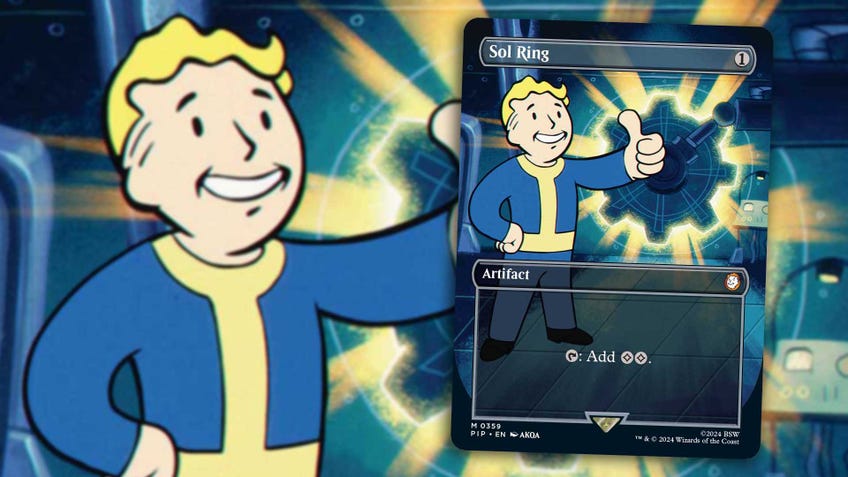
For returning mechanics, we’ve got Proliferate, Energy and Squad. Proliferate is the most well-known of these, having been introduced all the way back in October 2010 with Scars of Mirrodin, and basically lets you put more counters on anything or anyone that has counters on it.
The other two mechanics are more niche, which is always fun for anyone who likes playing with them in MTG formats like Commander.
Energy was introduced in the Kaladesh Block, and basically hasn’t been since outside of the MTG Arena-specific set Jumpstart: Historic Horizons. Some cards generate energy, and some cards use it, but anyone who played in Kaladesh will remember the sheer power of the mechanic - and either let out a little noise for joy or a deep, sorrowful sigh.
Then there’s Squad, which you’d be forgiven for thinking is a new mechanic, but was actually originally printed back in the Warhammer 40,000 decks in 2022. Squad allows you to pay a mana cost, as many times as you want, to get a number of copies of the card you’ve just cast. If you cast a three-cost creature with Squad 2, then pay four extra mana, you’ll get three copies of the card.
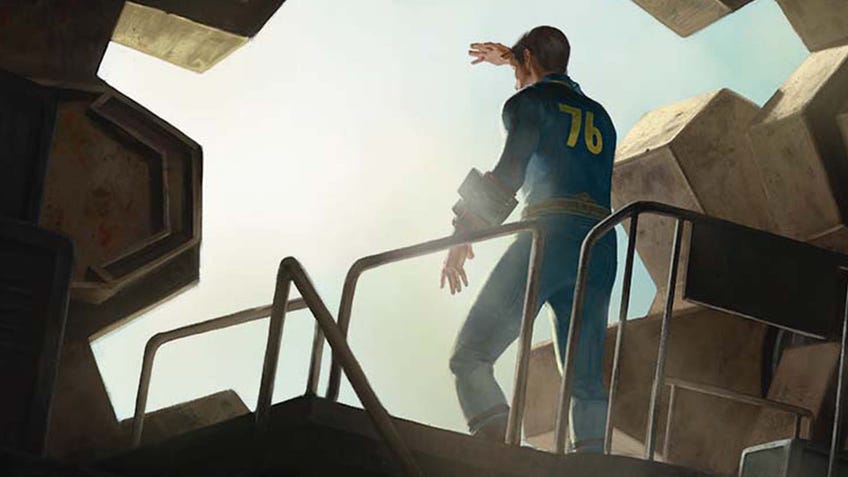
The two new mechanics in the Fallout Commander decks are junk tokens and rad counters. Junk tokens have the most potential to be a big upset for the game, because they’re another new kind of artifact token akin to treasure and clues. Junk tokens can be tapped and sacrificed to exile the top card of your library. Until the end of the turn you can then play that card - if you don’t, it stays exiled.
The four decks are generally solid but, with so many Commander decks every year, they do feel a little uninspired.
This just seems like a very potent ability. In a deck that wants to play things from exile - of which there are many - these are just upgraded clue tokens, because they not only cost no mana, but also have so many synergies in Commander with cards like Laelia, the Blade Reforged, who gets stronger whenever you put cards into exile; and Wild Magic Sorcerer, who grants Cascade to the first spell you cast from exile each turn.
Then there are rad counters, a new addition to the arsenal of people who like to use mill as a strategy. For each rad counter a player has, they have to mill that many cards. Then, for each nonland card that’s milled that way, they lose one life and remove a rad counter. This mechanic obviously pairs nicely with Proliferate, but is also just an intriguing bit of design to represent the idea of radiation in general.
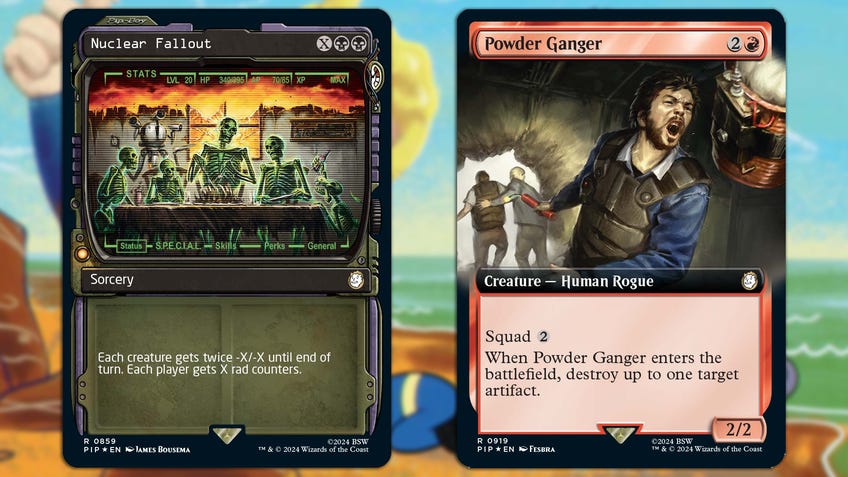
The four decks are generally solid as a whole but, with so many Commander decks every year now, they do feel a little uninspired when it comes to what they’re aiming to do. Scrappy Survivors is a red, green and white deck that’s all about enchantments and junk tokens. Hail, Caesar is a red, white and black deck that’s about creature tokens and sacrifice. Mutant Menace is a black, green and blue deck that’s about rad counters and milling. Finally, Science! is a blue, red and white deck that’s all about energy counters, artifacts and drawing cards.
Playing with the Fallout decks is fun, but it’s getting harder and harder to make truly new decks at this point without just power-creeping old ones. The standouts, at least for us, are probably Science! and Scrappy Survivors. That’s mostly because of the mechanics that these decks focus on, which are generally a little more powerful and interesting, as well as being a bit more flexible too. (Plus, Dogmeat is the most recognisable Fallout character going, so Scrappy Survivors has a big headstart on the likeability front.)
MTG’s Fallout Commander decks are pretty great from a mechanical standpoint, but the characters in them lack punch and pull compared to the other crossover releases so far. It’s all enjoyable, and helped here by the gameplay on offer, but future sets may struggle to draw people in in the same way as universes with a bit more charisma.
